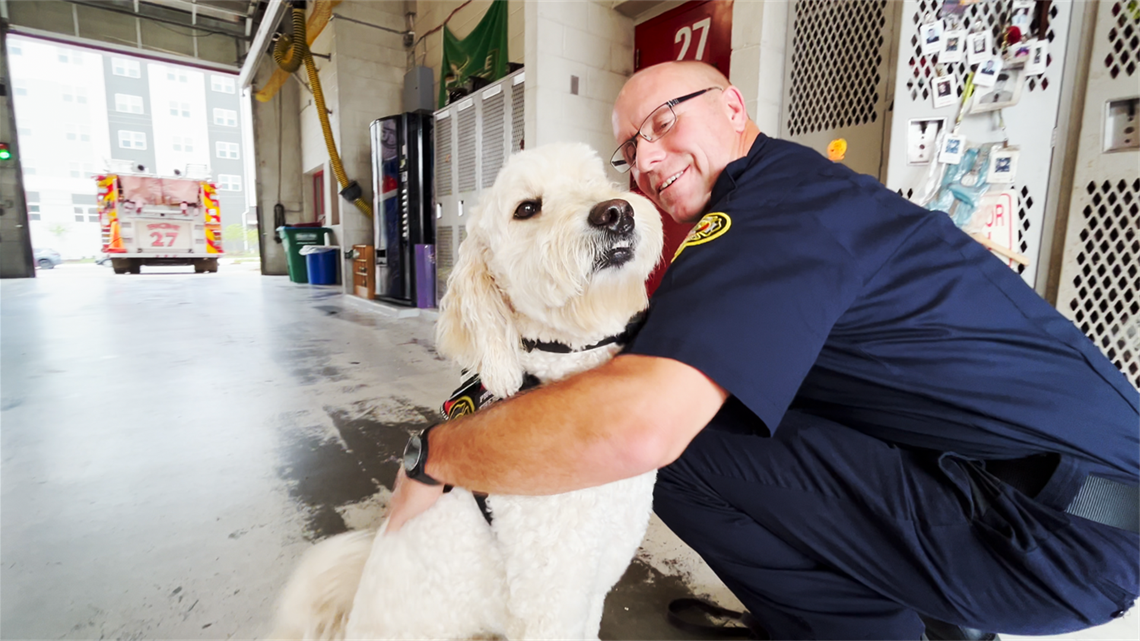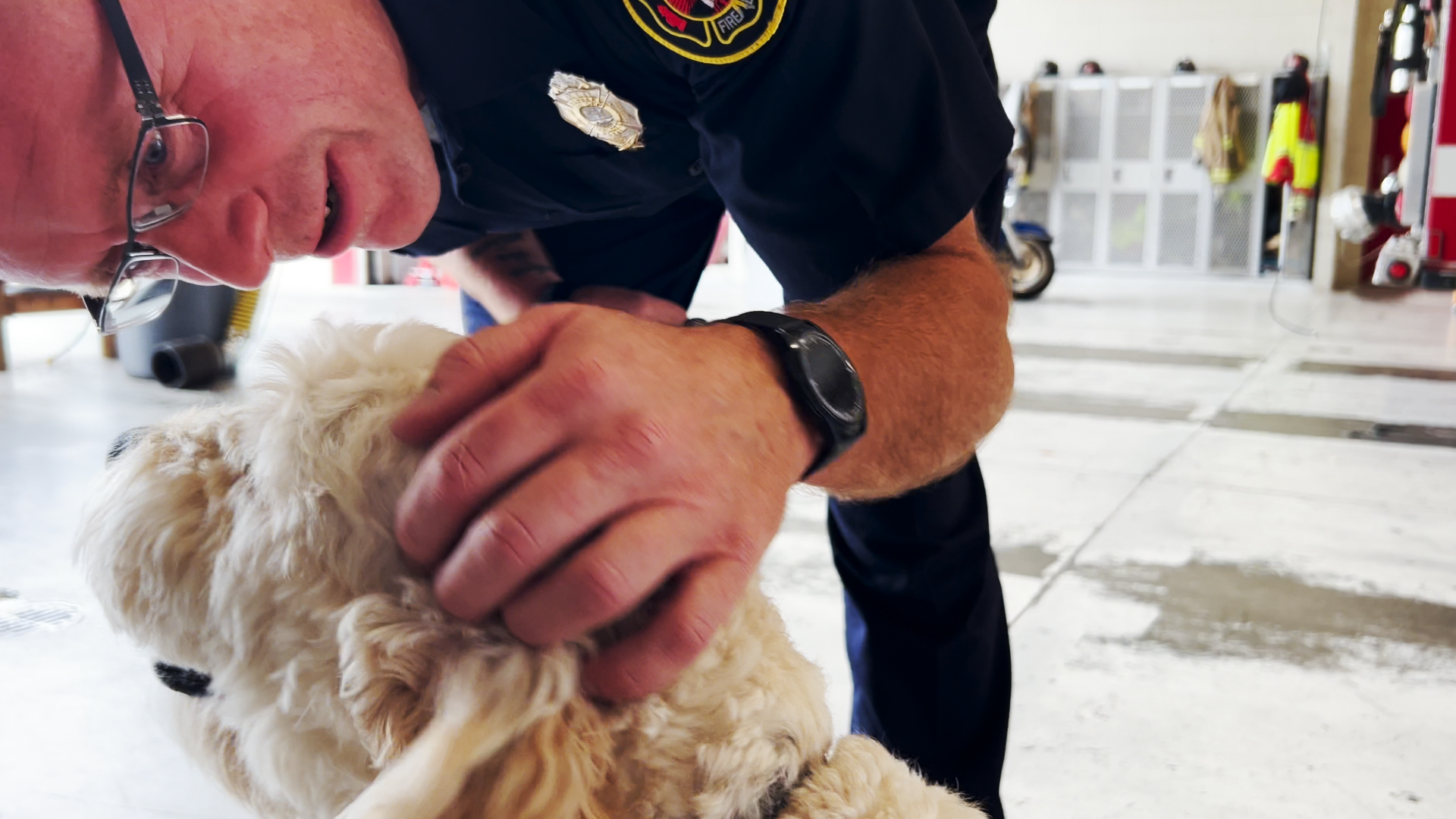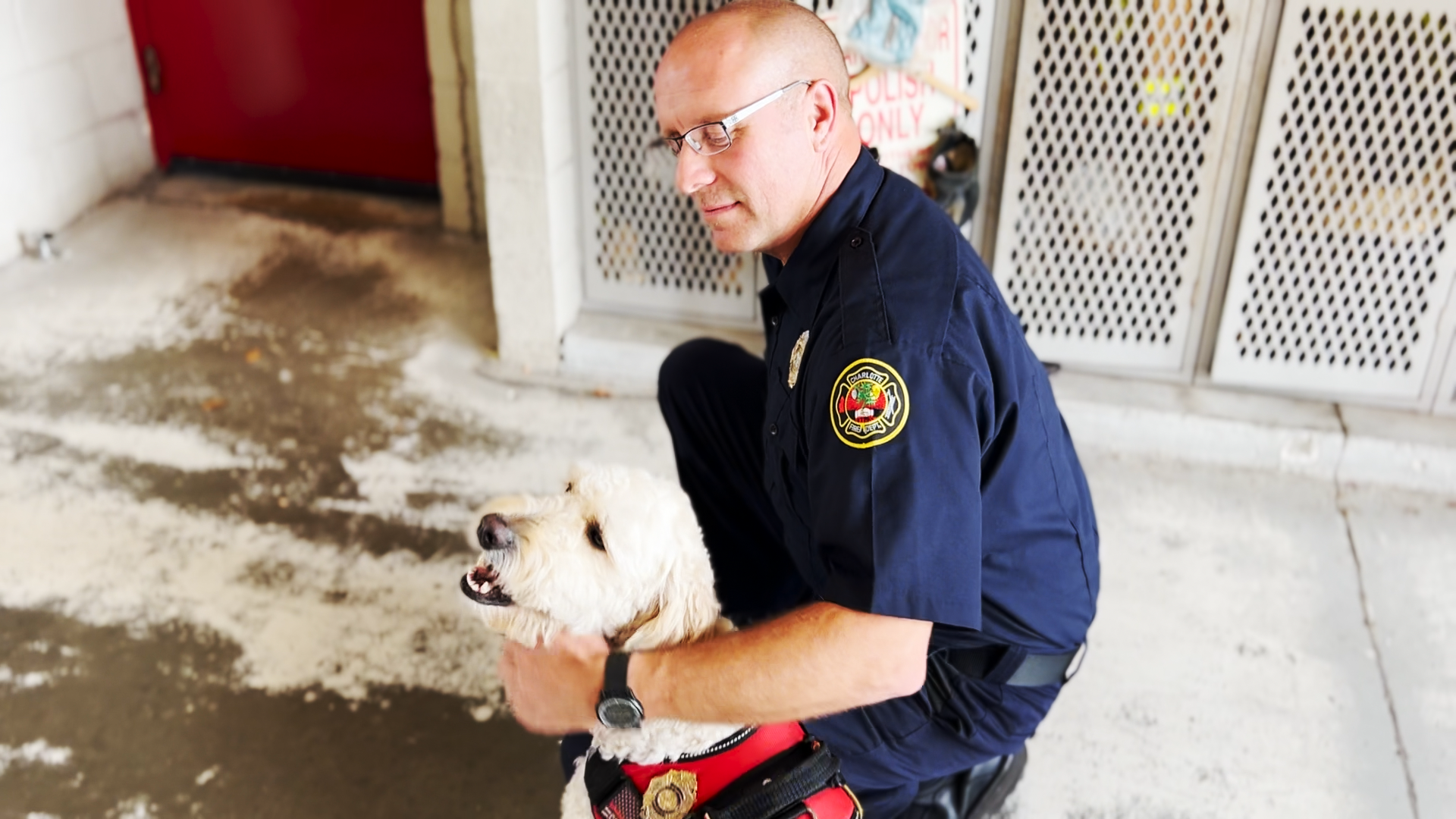Firefighter and Therapy Dog: A Bond Beyond Duty
Published on August 16, 2024

Charlotte Firefighter Matt Wiatrowski and Charlotte Fire K9 Therapy Dog, Phoenix.
By Kevin Campbell
At Charlotte Firehouse 27, a unique partnership has become a beacon of hope and mental health awareness. Firefighter Matthew Wiatrowski and his therapy dog, Phoenix, are not just colleagues in service; they are a testament to Charlotte Fire Department's commitment to mental health and the transformative power of the K9 Therapy Program.
Matthew Wiatrowski, originally from New York, moved to Charlotte after a 16-year stint as a volunteer firefighter in his home state. His transition to the Charlotte Fire Department marked a new chapter in his life, but it also came with significant personal challenges.
"I figured being a firefighter would be best for me. I worked for the United States Post Office before coming to Charlotte from New York, and I figured, why not do something that I love to do? My father was a volunteer as well, and it’s sort of in my blood," Wiatrowski shared.

Wiatrowski's passion for firefighting was unwavering, but the job's emotional toll became increasingly difficult to bear. The constant exposure to traumatic events, long hours, and high-stress situations started to take a toll on his mental health. The turning point in his life came in the form of a 3 1/2-year-old Goldendoodle named Phoenix.
"Phoenix is a therapy dog for the fire department and right now, she's the only dog in operations. She comes to work with me every day, and when the call comes in, she goes to her kennel. When she's here, she helps the people here deal with everyday life. Fire department life running calls all the time. We're at one of the busiest stations, and she helps not only them but also me a lot," Wiatrowski explained.

Phoenix’s presence at the station is more than a morale booster; it’s a lifeline. Wiatrowski candidly shared his struggles with depression, a battle he was losing until Phoenix arrived.
"I was in a deep depression, and if it wasn't for her, I probably wouldn't be here right now. Phoenix is always playful and happy. When I was in my darkest times, she was there with a silly grin and a wagging tail. She got me out of my rut and made me play with her, which helped me a lot," he said.
Wiatrowski’s experiences underscore the importance of Charlotte Fire’s K9 Therapy Program, a pioneering initiative designed to support the mental health of fire and rescue personnel. The program operates under the Charlotte Fire Health and Safety Division, overseen by Division Chief of Health and Safety Jason Purdue.

"Behavioral health demands surge as our staff faces intense challenges. Long shifts, high-stress incidents, and emotional burdens take their toll. Witnessing human suffering compounds the strain," said Charlotte Fire Chief Reginald Johnson. "Our K9 program offers a unique solution, providing comfort and support to those under pressure. This approach helps reduce workplace stress. It ensures our team stays well in tough conditions."
Phoenix and other therapy dogs in the program are trained and certified to provide comfort and emotional support to both department personnel and civilians. Clinical evidence supports the effectiveness of therapy dogs in reducing anxiety, stress, and blood pressure, especially for those experiencing trauma.
"Therapy dogs are used extensively in fire stations, EMS stations, courthouses, and hospitals for this purpose. In addition to providing emotional support, our K9s are involved in community engagement and education efforts," the Behavioral Health Specialist added.

For Wiatrowski, being part of the K9 program is deeply personal. His journey through loss, depression, and alcoholism has made him a strong advocate for mental health support.
"I've dealt with a lot in my life – loss of two children, deep depression, alcoholism. It’s not about me. I try to focus on ‘we’ as a team. If I'm part of a group, I feel like I'm part of something. Mental health is really important, especially in this job. We see shootings, stabbings, burned homes, and people losing their lives. It weighs on you," Wiatrowski said.

Wiatrowski's message to his fellow firefighters is clear: address your mental health needs promptly.
"Try to take care of it as soon as you possibly can. We see a lot of things on the job, and a lot of people don't deal with it right away. They wait or think they're too proud. In the future, it’s going to weigh so much on you that you're going to explode. It's still a cup you have to carry, and it still gets heavy if you carry it for a long period," he emphasized.

The 988 Lifeline is a national network of local crisis centers that provides free and confidential emotional support to people in suicidal crisis or emotional distress 24 hours a day, 7 days a week in the United States. Using 988 is free. When you call, text, or chat 988, your conversation is confidential. 988 provides you judgment-free care. Talking with someone can help save your life.

The Charlotte Fire Department's K9 Therapy Program exemplifies a progressive approach to mental health in the fire service. By integrating therapy dogs like Phoenix into daily operations, the department not only provides immediate emotional relief but also fosters a supportive environment for its personnel.
For Wiatrowski and Phoenix, their bond is a symbol of resilience and hope. Together, they navigate the challenges of firefighting, proving that with the right support, even the heaviest burdens can be lightened.